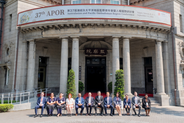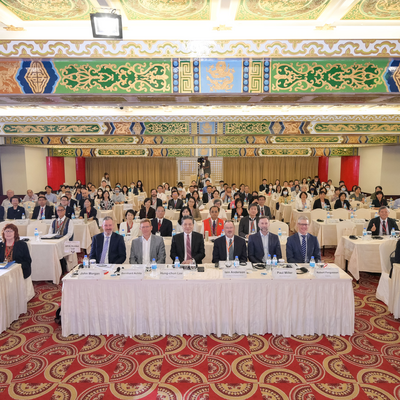The Control Yuan hosted the 37th Australasian Pacific Ombudsman Region (APOR) Conference from September 3 to 5, 2025, with the three-day event successfully encompassing the APOR Members’ Meeting, an international seminar on human rights, and culture tours.
The APOR Members’ Meeting was held on the afternoon of September 3, presided over by APOR Director and Commonwealth Ombudsman of Australia Iain Anderson. The meeting discussed the Communiqué of the APOR Conference and 37th Members’ Meeting, which referenced the 2019 Venice Principles and United Nations General Assembly Resolution A/RES/79/177 of 2024, reaffirming the central role of Ombudsman institutions in maintaining public trust, promoting accountability, and safeguarding human rights. The communiqué explored the need for AI applications in public governance to maintain transparency and accountability without infringing upon fundamental rights and democratic values, and expressed solidarity with resource-constrained Ombudsman institutions in the Pacific and other regions while committing to continued regional cooperation and trust-building.
The International Seminar was held on September 4. Control Yuan Vice President Hung-chun Lee delivered opening remarks, noting that the responsibilities of Ombudsman institutions are increasingly diverse and must evolve with the times to continue protecting citizens’ fundamental rights. In 2020, Taiwan established the National Human Rights Commission under the Control Yuan, demonstrating its commitment to human rights as a fundamental principle and its determination to align with the international community in pursuing universal democratic values. This was followed by pre-recorded remarks from APOR President and Cook Islands Ombudsman Niki Rattle, subsequently by remarks from International Ombudsman Institute Secretary General Bernhard Achitz and Acting Deputy Director of the American Institute in Taiwan John Morgan.
The September 4 seminar proceeded in three sessions, focusing on Ombudsman practices and emerging human rights issues. The first session, “How to Increase Citizens’ Awareness of the Work and Mission of Ombudspersons,” was chaired by Commonwealth Ombudsman of Australia Iain Anderson, with presentations by Ombudsman of Dayton-Montgomery County, Ohio Diane Welborn; Ombudsman of Papua New Guinea Tabitha Suwae; Deputy Director-General of the Administrative Evaluation Bureau of Japan’s Ministry of Internal Affairs and Communications Daisuke Otsuki; and Control Yuan Member pasuya poiconx. The session examined how to make the work of Ombudspersons more tangible to the public through investigation reports addressing public concerns, field visits, and publications in newspapers, magazines, and electronic media, directly addressing core issues and providing concrete directions for improvement to government and society.
The second session, “The Practice and Implementation of the National Preventive Mechanism,” was chaired by Control Yuan Member Chu-fang Chang, with presentations by Commonwealth Ombudsman of Australia Iain Anderson, IOI Secretary General Bernhard Achitz, and Control Yuan Member Chung-yi Tsai. The session addressed prohibition of torture issues raised in Taiwan’s successive Concluding Observations under the International Covenants, drawing on Australian and Austrian practical experiences to offer recommendations for institutional advancement, achieving prevention through inspections and improving post-incident accountability to prevent human rights violations.
The third session, “Artificial Intelligence, Human Rights, Democracy and the Rule of Law,” was chaired by Diane Welborn, with presentations by New South Wales Ombudsman Paul Miller, Deputy Director of the Democratic Governance Research Program at the Research Institute for Democracy, Society, and Emerging Technology Yu-hao Lai, and Control Yuan Member Wen-cheng Lin. The session explored the impacts of rapid AI development and convenience on government and industry, emphasizing that government policy implementation must remain centered on human rights, reduce digital divides affecting vulnerable groups, consider the growing importance of cross-sector public-private cooperation, assess human rights impacts, and explore feasible disclosure mechanisms.
During the conference’s closing remarks, Control Yuan Vice President Lee thanked the distinguished guests for their valuable insights, emphasizing the inseparable connection between the exercise of Ombudsman powers and the protection of fundamental human rights. The Control Yuan pledged to continue actively promoting good governance and protecting human rights, deepening regional cooperation and exchanges, and working hand-in-hand with Ombudsman institutions worldwide to advance with the times and jointly defend people-first good governance.
Source: The Control Yuan, Taiwan


